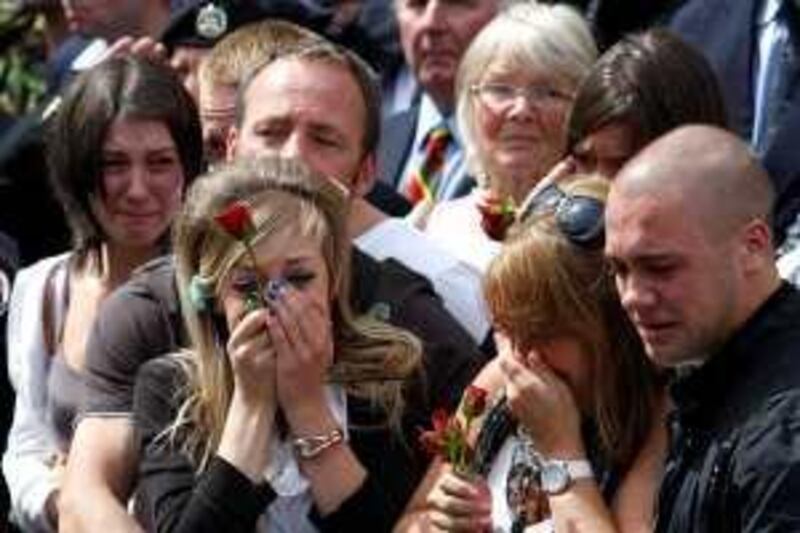LONDON // Support for Britain's military involvement in Afghanistan has plummeted to an all-time low. An opinion poll yesterday showed that, for the first time, a majority of Britons wanted the 9,000 troops brought home, a reflection of the fact that more than 20 UK soldiers have been killed so far this month, mainly by roadside bombs. Until now, opinion polls have been showing a solid majority in favour of British troops remaining in Afghanistan, but the ComRes survey for The Independent newspaper yesterday suddenly showed that 52 per cent were in favour of an immediate pull-out. The poll, conducted among more than 1,000 adults over the past few days, found that 58 per cent now regarded the war in Afghanistan as unwinnable. A similar survey conducted this month for The Guardian newspaper indicated that, at the time, only 42 per cent wanted an immediate withdrawal. The latest findings come at a time of ever-louder voices being heard expressing disquiet over the purpose of Britain's involvement in Afghanistan. An editorial in yesterday's Daily Mail newspaper said: "One hundred and ninety-one servicemen have now died in Afghanistan and still our government is unable to explain clearly what they are doing there. "No one doubts that an immediate withdrawal from Afghanistan could have very damaging consequences, not only leaving that beleaguered nation wide open to becoming, once again, an incubator for terrorism, but also destabilising Pakistan, our shaky but hugely important ally in the region. "But we cannot continue to stay put at the cost of more British lives without a clear military or diplomatic strategy." David Miliband, the UK's foreign secretary, accepted during a speech to Nato members on Monday that the public "wanted to know whether and how we can succeed" in Afghanistan. Urging the Afghan government to open negotiations with "moderate" Taliban leaders, Mr Miliband said a viable political solution, in conjunction with the military offensive, was an essential part of securing Afghanistan's future. He urged that efforts be made to reintegrate some insurgents into society and even be given roles in local and central government - something that Afghanistan's leadership has been notably reluctant to do up to now. Mr Miliband said a distinction had to be drawn between "hard-line ideologues" and jihadist terrorists, with whom there could be no dialogue and who had to be defeated by force of arms, and the moderates who could be "drawn into a political process". He made his comments as the UK declared victory in the first stage of Operation Panther's Claw, a six-week offensive by more than 3,000 UK troops to rid an area of Helmand province of the Taliban ahead of next month's presidential elections. Brig Tim Radford, commander of the Helmand task force, said: "I am absolutely certain that the operation has been a success. We've had a significant impact on the Taliban in this area, both in terms of their capability and their morale." British commanders estimated that there were up to 500 Taliban in the area before the start of Panther's Claw and virtually all are now believed to have either fled or been killed. Commanders refuse, however, to give estimates of the number killed. Gordon Brown, the British prime minister, interrupted his holiday to pay tribute to the soldiers involved in the campaign. "The efforts of our troops in Helmand have been nothing short of heroic," he said. "There has been a tragic human cost. But this has not been in vain. What we have actually done is make land secure for about 100,000 people - what we've done is push back the Taliban. "And what we've done also is to start to break that chain of terror that links the mountains of Afghanistan and Pakistan to the streets of Britain." However, Lord Paddy Ashdown, who served as the UN's High Representative in Bosnia from 2002 to 2005, told the BBC that it was too early to declare the operation a success. "Do we have enough troops to hold this ground, to stop the Taliban coming back in as they've done in the past?" he asked. "If not, this isn't a success; it's a prelude to a repeat of the past." dsapsted@thenational.ae
British public turn against Afghan war
A poll shows that 58% consider the war unwinnable and 52% want their country's troops pulled out immediately.

Editor's picks
More from the national





